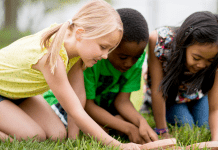Your kids.
You love them.
You’d do anything for them.
You want to protect them.
How does that relate to social media consumption?



But in a world where adults don’t even know which way is up, in a world where we don’t know how to navigate this “new normal,” where we are, daily, smacked in the face with “news.” Where we can’t tell what’s true, how do you protect them?
Talk About Media Consumption
Don’t let the fear of fake news stop you from talking to your kids about healthy media consumption. You don’t want them navigating this virtual world blindly. Talk to them. Tell them your fears. Tell them that finding the truth in social media is hard. Open the lines of communication so that they feel comfortable coming to you with questions.

Model Appropriate Media Consumption
It’s funny that we use that word to mean viewing media. Media consumption. Consuming media. Would you let your children consume whatever junk food they wanted? Whenever did they want? NO! Of course not. You have meals. You have snacks. You teach your children a healthy way to consume food. We can also teach our children a healthy way to consume media. We teach moderation. We teach the importance of moderation. And we model media moderation with our own devices.
Teach How to Ask Questions
Who wrote it? Why did they write it? Who published it? Are the facts accurate? When was it published? What is the agenda? Yes. Everyone has an agenda. We aren’t teaching our children to be skeptics. We are teaching them to be critical thinkers.




Teach How to Interpret Statistics
Correlation does NOT NOT NOT equal causation—I can’t emphasize this enough. Correlation does NOT equal causation. Here is what this means – just because two things are related. Meaning, as one goes up – the other goes down. Or as one goes down, the other goes up. Or as one goes up – the other goes up. Are you following? Correlated = related = there is some pattern. This idea does NOT mean that one causes the other. Here is an example.
As the number of ice cream sales increase, so does the rate of violent crime across the country.
Does this mean that ice cream causes violent crime?!? OF COURSE NOT! They are correlated. There is a pattern. One does not cause the other. There is a THIRD variable. WEATHER. As the weather gets warmer, ice cream sales increase. As the weather gets warmer, violent crimes increase.
Statistics are NOT bad, but they’re interpreted in many different ways. Some “facts” are not as true as others. So read carefully.

Discuss the Reliability of the Source
Just because your friend’s aunt’s sister’s neighbor saw it on social media, does not mean that it is true. Where is the information coming from? People spend hours trying to find milk from grass-fed, locally farmed cows because they NEED to know where their milk is coming from, yet, will believe whatever Uncle Buster posts on Twitter? That’s nuts. Know where your “facts” are coming from—research how reliable those sources are. Teach your children how to do research. The internet is full of false information. They must learn where to find the truth.


















